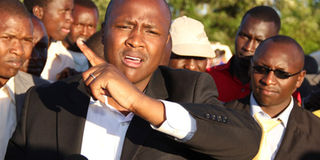Government has shortchanged youth again

Nandi Hills MP Alfred Keter. The first-term MP expressed shock at last week’s parastatal appointments by President Kenyatta, saying it was a continuation of what has been happening since the March election. PHOTO/FILE
What you need to know:
- When the President announced the new Cabinet, he did not create a ministry dedicated to youth affairs. Instead, the President promised to form a youth directorate to oversee their programmes, which has not materialised to date.
- The common misperception, which has refused to go away over the years, is that youth are inexperienced as opposed to elders who are considered wise and experienced.
The government has once again backtracked on the promise made during the campaigns to empower the youth if the recent parastatal chiefs’ appointments are anything to go by.
It started early this year with the appointment of Cabinet and Principal Secretaries, which failed the youth representation test.
Another failed attempt to empower the youth is the directive to give them public tenders. This has failed to materialise due to lack of a sound policy framework, and the presence of powerful cartels in government departments that are still controlling procurement processes.
The recent appointment of 36 heads of parastatals, largely drawn from among retired civil servants and politicians, is a clear indication that the government is more concerned about consolidating power than addressing youth unemployment.
Why is the government overlooking the youth in public service appointments? If one looks at the role they are playing in the private sector, it is clear they are the ones driving the economy.
When the President announced the new Cabinet, he did not create a ministry dedicated to youth affairs. Instead, the President promised to form a youth directorate to oversee their programmes, which has not materialised to date.
Debate on the recent appointments has gone viral in the social media, with young people expressing outrage at how the government has lost touch with their plight. Considering the role they play in elections, this is not a good political capital for the government.
Kenya, like many African countries has a huge proportion of the youth as its population. Young people aged 35 and below constitute 78 per cent of the population. However, appointments and promotions in the public service are not commensurate with this reality.
The common misperception, which has refused to go away over the years, is that youth are inexperienced as opposed to elders who are considered wise and experienced. But leadership is not just about experience. There are other strengths such as focus and creativity that young people can inject in public service.
While it is vital to tap into the experience and the wisdom of elders, it is equally important to integrate the vigour of the youth. As Kofi Annan has rightly noted; “Any society that does not succeed in tapping into the energy and creativity of its youth will be left behind”.
As a country, we will not make headway unless and until we recognise the enormous potential of our youth. The country has created enough education opportunities and without creating policies that both encourage absorption in the public sector and support of entrepreneurial skills, the efforts will go down the drain.
The government must match its words with action. Most important, it should move fast and implement the promises it made to the youth during elections.
Mr Obonyo Raphael Obonyo is a Global Young Diplomat and the external adviser on the UN Habitat’s Youth Advisory Board ([email protected]).





